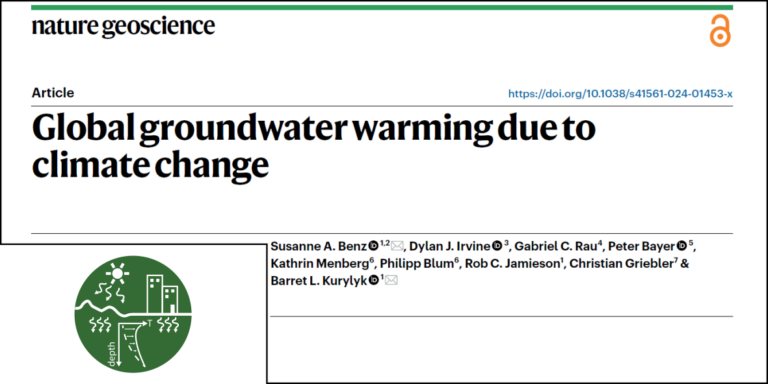Understanding how groundwater is warming helps us plan better for the future. It is essential for protecting our drinking water, supporting agriculture, and maintaining healthy ecosystems. In this context, a team of scientists involving Peter Bayer has made a significant discovery, published in Nature Geoscience. The study “Global Groundwater Warming Due to Climate Change” (Benz et al.) uncovers a hidden consequence of climate change: the warming of groundwater around the world.
The study gathered significant media attention, and this widespread interest underscores the importance of the research in this field and its implications for public policy and environmental management, e.g.:
To read the full study, please visit Nature Geoscience: Benz, S. A., Irvine, D. J., Rau, G. C., Bayer, P., Menberg, K., Blum, P., Jamieson, R.C., Griebler, C., Kurylyk, B. L. 2024. Global groundwater warming due to climate change. – Nature Geoscience, doi.org/10.1038/s41561-024-01453-x .
Abstract
Aquifers contain the largest store of unfrozen freshwater, making groundwater critical for life on Earth. Surprisingly little is known about how groundwater responds to surface warming across spatial and temporal scales. Focusing on diffusive heat transport, we simulate current and projected groundwater temperatures at the global scale. We show that groundwater at the depth of the water table (excluding permafrost regions) is conservatively projected to warm on average by 2.1 °C between 2000 and 2100 under a medium emissions pathway. However, regional shallow groundwater warming patterns vary substantially due to spatial variability in climate change and water table depth. The lowest rates are projected in mountain regions such as the Andes or the Rocky Mountains. We illustrate that increasing groundwater temperatures influences stream thermal regimes, groundwater-dependent ecosystems, aquatic biogeochemical processes, groundwater quality and the geothermal potential. Results indicate that by 2100 following a medium emissions pathway, between 77 million and 188 million people are projected to live in areas where groundwater exceeds the highest threshold for drinking water temperatures set by any country.



